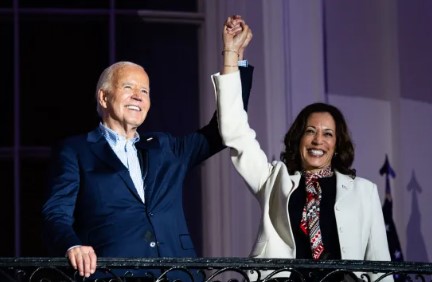In a dramatic turn of events, President Joe Biden announced his withdrawal from the 2024 presidential race on Sunday, endorsing Vice President Kamala Harris as the Democratic Party’s new nominee. This pivotal decision marks a significant shift in the upcoming presidential election.
At 81, Biden cited the “best interest of my party and the country” as his reasons for stepping down, following intense scrutiny over his age and mental fitness after a challenging debate against Donald Trump in June.
The unexpected announcement, made while Biden was recuperating from Covid at his beach house in Delaware, has thrown the Democratic Party into a state of flux just ahead of the November 5 election. However, it could reinvigorate the party, as Harris has swiftly committed to her goal of becoming the first female president and defeating Trump.
Trump, responding on his Truth Social network, claimed that Biden’s decision confirmed his belief that Biden is “not fit to run” and thus not “fit to serve.”
This major shift is likely to disrupt Republican strategies, which had been focused on Biden, now facing Trump—at 78, the oldest presidential nominee in history—in a contest against a younger opponent.
Biden’s withdrawal had been anticipated but came as a surprise to many. In a letter shared on X, he expressed that serving as president had been his “greatest honor” and indicated his intention to focus on his current duties for the remainder of his term. He stated that he would address the nation later in the week, with no public events scheduled for Monday.
Following his withdrawal, Biden offered his “full support and endorsement” to Harris, and his campaign has officially changed its name to “Harris for President.” This endorsement has quickly garnered support from prominent Democrats and potential rivals, such as California Governor Gavin Newsom.
In a rapid fundraising response, the Democratic group ActBlue reported that Harris raised $27.5 million in small-donor contributions within just five hours.
The Democratic Party now faces the task of confirming Harris as their candidate at their convention in Chicago on August 19. Harris, the first Black and South Asian woman vice president in U.S. history, praised Biden for his “selfless and patriotic act” and vowed to “earn and win” the nomination.
Former President Barack Obama, still an influential figure, acknowledged the uncertain path ahead, describing the situation as “uncharted waters.”
Biden’s decision comes after a period of isolation due to his Covid infection, during which he consulted only with close family and aides. First Lady Jill Biden showed support by reposting his statement with a simple gesture of two hearts.
As Republicans prepare to challenge Harris, Trump’s new running mate J.D. Vance highlighted Harris’s close association with Biden, whom he criticized as “the worst president in my lifetime.”
This marks the first time in U.S. history that a sitting president has exited the race so late. Biden’s presidency, which began in January 2021, was characterized by efforts to heal the nation after the tumultuous Trump years, support for Ukraine, and substantial Covid recovery and green industry initiatives. However, he faced criticism for issues such as the chaotic U.S. withdrawal from Afghanistan, rising inflation, and support for Israel’s actions in Gaza, with concerns about his age growing over time.

















